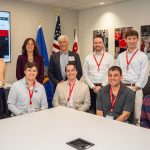Education
Congressional Staff Visit Highlights Stony Brook’s Research Impact

Stony Brook University hosted its inaugural Congressional Staff Visit Day on August 21, 2023, welcoming representatives from the offices of Senator Chuck Schumer, Senator Kirsten Gillibrand, Representative Nick LaLota, and Representative Laura Gillen. This event showcased how federal investments in research are fueling innovation and economic development on Long Island and across the nation.
The day began with a presentation from President Andrea Goldsmith, who emphasized Stony Brook’s role in research leadership and its commitment to addressing national priorities. Since 2020, congressional representatives have secured over $175 million in critical research funding for the university. “We are deeply grateful for the support of Stony Brook by our Congressional leaders,” Goldsmith stated, highlighting the importance of collaborative partnerships in driving innovation and workforce development.
Throughout the visit, attendees witnessed firsthand the breadth of research projects supported by federal funding. Notable initiatives include advancements in biopolymer research, energy security, and the establishment of a long-distance quantum networking testbed on Long Island. These projects illustrate the transformative impact of federal investment in both health and economic growth.
Spotlighting Innovative Research and Faculty Contributions
The day’s program began at the Charles B. Wang Center, where university leaders provided an overview of Stony Brook’s expanding research capabilities. Congressional staff engaged with faculty members from diverse disciplines, including engineering, materials science, and robotics. Experts presented projects addressing significant issues, such as cybersecurity in extreme environments and the development of soft robotics for next-generation vehicles.
Among the faculty highlights, Michael Dudley showcased his pioneering work in semiconductor crystal growth, supported by funding from agencies including the National Science Foundation (NSF) and NASA. His research is directly linked to the new $20 million semiconductor research and development facility, the Onsemi Center for SiC and Related Materials.
Additionally, Dilip Gersappe discussed his $4 million U.S. Army-funded project focused on developing antifreeze hydrogels to enhance infrastructure in colder climates. Other faculty members, such as Nick Nikiforakis, recognized for his expertise in cybersecurity, and Emre Salman, who is advancing low-power AI chip design, also contributed to the rich dialogue.
Advancements in Health and Energy Research
The delegation then moved to the Renaissance School of Medicine and Stony Brook University Hospital, where they explored how federally funded research is enhancing human health. Discussions included the medical school’s strategic plan and initiatives in infectious disease, cancer clinical trials, and artificial intelligence in medicine.
Faculty members demonstrated how federal support drives breakthroughs in treatment and diagnostic technologies. Tours of the hospital’s research facilities showcased advanced capabilities, including the ABSL-3 infectious disease lab and the PET/Cyclotron imaging center. Each site visit reinforced the university’s mission to translate research into patient care efficiently.
On the West Campus, attendees examined ongoing research in computational science, quantum technology, and clean energy. At the Institute for Advanced Computational Sciences, faculty illustrated how high-performance computing and AI accelerate discovery across various fields. The New York State Quantum Internet Testbed, noted as the nation’s largest entanglement distribution network, was also highlighted for its role in developing secure communications.
The experience underscored Stony Brook’s position as a leader in research and innovation, particularly in addressing pressing societal challenges. The collaborative efforts between the university and its congressional supporters further emphasize the significance of federal partnerships in sustaining impactful research.
As the day concluded, it was evident that the strong relationship between Stony Brook University and its congressional representatives is essential for fostering research that not only benefits New York State but also contributes to national and global advancements. The visit also reflected the university’s commitment to leveraging federal engagement to enhance its role in shaping policy and amplifying its voice in the scientific community.
-

 Technology5 months ago
Technology5 months agoDiscover the Top 10 Calorie Counting Apps of 2025
-

 Health2 months ago
Health2 months agoBella Hadid Shares Health Update After Treatment for Lyme Disease
-

 Health3 months ago
Health3 months agoErin Bates Shares Recovery Update Following Sepsis Complications
-

 Technology4 months ago
Technology4 months agoDiscover How to Reverse Image Search Using ChatGPT Effortlessly
-

 Technology1 month ago
Technology1 month agoDiscover 2025’s Top GPUs for Exceptional 4K Gaming Performance
-

 Technology2 months ago
Technology2 months agoElectric Moto Influencer Surronster Arrested in Tijuana
-

 Technology5 months ago
Technology5 months agoMeta Initiates $60B AI Data Center Expansion, Starting in Ohio
-

 Technology5 months ago
Technology5 months agoRecovering a Suspended TikTok Account: A Step-by-Step Guide
-

 Health4 months ago
Health4 months agoTested: Rab Firewall Mountain Jacket Survives Harsh Conditions
-

 Lifestyle5 months ago
Lifestyle5 months agoBelton Family Reunites After Daughter Survives Hill Country Floods
-

 Technology4 months ago
Technology4 months agoHarmonic Launches AI Chatbot App to Transform Mathematical Reasoning
-

 Technology3 months ago
Technology3 months agoUncovering the Top Five Most Challenging Motorcycles to Ride





















